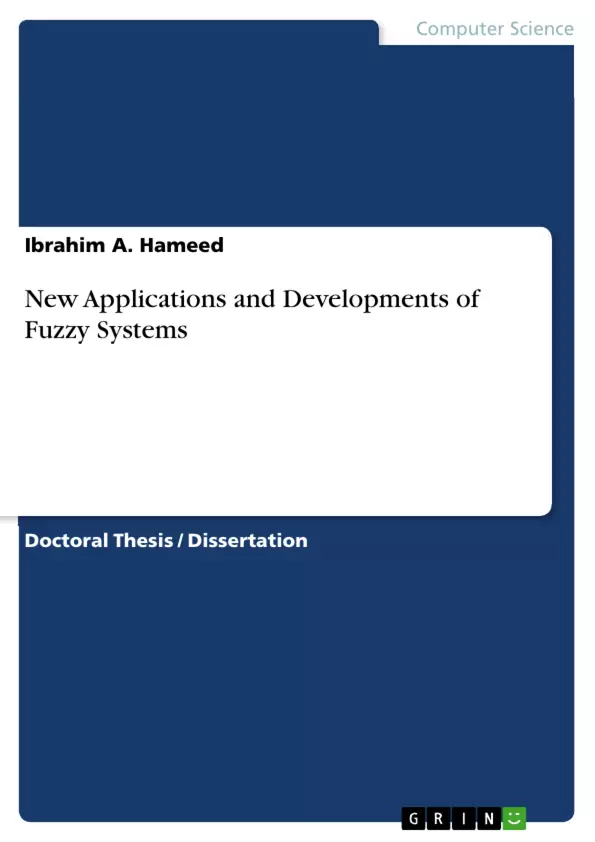Fuzzy Logic (FL) is a particular area of interest in the study of Artificial intelligence
(AI) based on the idea that in fuzzy sets each element in the set can assume a value from
0 to 1, not just 0 or 1, as in classic or crisp set theory. The gradation in the extent to
which an element is belonging to the relevant sets is called the degree of membership.
This degree of membership is a measure of the element’s belonging to the set, and thus of
the precision with which it explains the phenomenon being evaluated. A linguistic
expression is given to each fuzzy set. The information contents of the fuzzy rules are then
used to infer the output using a suitable inference engine. The key contribution of fuzzy
logic in computation of information described in natural language made it applicable to a
variety of applications and problem domains; from simple control systems to human
decision support systems. Yet, despite its long-standing origins, it is a relatively new field,
and as such leaves much room for development.
The thesis presents two novel applications of fuzzy systems; a human decision
support system to help teachers to fairly evaluate students and two hybrid intelligent
fuzzy systems; a type-2 fuzzy logic system and a combined type-1 fuzzy logic system and
extended Kalamn filter for controlling systems operating under high levels of
uncertainties due to various sources of measurement and modeling errors.
The combination of fuzzy logic and the classical student evaluation approach
produces easy to understand transparent decision model that can be easily understood by
students and teachers alike. The developed architecture overcomes the problem of
ranking students with the same score. It also incorporated different dimensions of
evaluation by considering subjective factors such as difficulty, complexity and
importance of the questions. Although we discuss this approach with an example from
the area of student evaluation, this method evidently has wide applications in other areas
of decision making including student’s project evaluation, learning management systems
evaluation, as well as, other assessment applications. [...]
Inhaltsverzeichnis (Table of Contents)
- Introduction
- The Development of the BiLieF Project
- The BiLieF Project: Aims and Scope
- Methodology and Data Collection
- The BiLieF Questionnaire
- Data Analysis
- Results
- The Influence of Belief Systems on Life Satisfaction
- Religious Beliefs and Life Satisfaction
- Spiritual Beliefs and Life Satisfaction
- Secular Beliefs and Life Satisfaction
- The Relationship Between Beliefs and Wellbeing
- Beliefs and Mental Health
- Beliefs and Physical Health
- Beliefs and Social Relationships
- The Impact of Beliefs on Behavior
- Beliefs and Prosocial Behavior
- Beliefs and Risk-Taking Behavior
- Beliefs and Consumption Behavior
- Discussion
- The Importance of Belief Systems
- The Implications of the BiLieF Project
- Future Research Directions
Zielsetzung und Themenschwerpunkte (Objectives and Key Themes)
This research project, the BiLieF project, aims to investigate the influence of belief systems on various aspects of human life, including life satisfaction, well-being, and behavior. The study utilizes a comprehensive survey to collect data on beliefs, attitudes, and behaviors, which are then analyzed to understand the complex interplay between beliefs and human experience. Key themes explored in this work include:- The impact of religious, spiritual, and secular beliefs on life satisfaction.
- The relationship between beliefs and various dimensions of well-being, such as mental and physical health, and social relationships.
- The influence of belief systems on a range of behaviors, including prosocial, risk-taking, and consumption behaviors.
- The development and implementation of the BiLieF project, including its methodology, data collection, and analysis techniques.
- The broader implications of the findings for understanding the role of belief systems in individual and societal contexts.
Zusammenfassung der Kapitel (Chapter Summaries)
The chapters provide in-depth analyses of the data collected through the BiLieF project, exploring the relationship between belief systems and various aspects of human life. * The **Introduction** outlines the objectives and rationale for the BiLieF project, highlighting the importance of understanding the influence of belief systems. * The **Development of the BiLieF Project** chapter details the creation and implementation of the BiLieF project, including its methodology, data collection procedures, and the BiLieF questionnaire. * The **Results** chapter presents the findings of the research, examining the influence of belief systems on life satisfaction, well-being, and behavior. The chapter analyzes the data related to religious, spiritual, and secular beliefs and their impact on various aspects of human experience. * The **Discussion** chapter interprets the findings of the study, discussing the implications of the research for understanding the role of belief systems in shaping individual and societal contexts. The chapter also outlines potential future research directions.Schlüsselwörter (Keywords)
This research focuses on the multifaceted impact of belief systems on human life. Key terms and concepts explored include belief systems, life satisfaction, well-being, prosocial behavior, risk-taking behavior, consumption behavior, religious beliefs, spiritual beliefs, secular beliefs, BiLieF project, methodology, data analysis, and societal impact.Frequently Asked Questions
What is Fuzzy Logic in Artificial Intelligence?
Fuzzy Logic is an area of AI where elements can have a degree of membership between 0 and 1, allowing for the processing of imprecise or "fuzzy" information.
What is the objective of the BiLieF project?
The BiLieF project investigates how religious, spiritual, and secular belief systems influence life satisfaction, well-being, and human behavior.
How can Fuzzy Systems help in student evaluation?
Fuzzy models can incorporate subjective factors like question difficulty and importance to create a fairer and more transparent ranking of students.
What is the difference between religious and secular beliefs in terms of well-being?
The research explores the complex interplay of different belief types and their specific impacts on mental health, physical health, and social relationships.
What are hybrid intelligent fuzzy systems?
These are systems that combine fuzzy logic with other methods, such as Kalman filters, to control systems operating under high levels of uncertainty.
- Quote paper
- Ibrahim A. Hameed (Author), 2010, New Applications and Developments of Fuzzy Systems, Munich, GRIN Verlag, https://www.grin.com/document/190478



